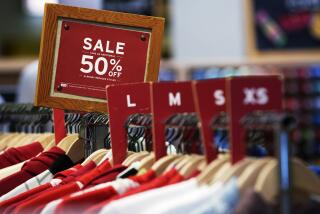Economy at Slowest Pace Since 1986 : GNP Rises at Annual Rate of 1.7% While Inflation Shoots Up
- Share via
WASHINGTON — The U.S. economy turned in its most sluggish performance in almost three years from April through June as inflation shot up dramatically, the government reported today.
In a report that is likely to raise recession fears, the Commerce Department said the gross national product, the broadest gauge of economic health, grew at a lackluster 1.7% annual rate in the spring quarter.
It was the worst growth rate since a 0.8% increase in the third quarter of 1986, the last time the economy skirted close to a recession.
Areas of Weakness
The sluggish growth reflected widespread weakness in big-ticket consumer spending and housing construction and a sharp deterioration in the country’s foreign trade performance.
Economists say further weakness in any of these areas could be enough to end the current record peacetime expansion, now in its seventh year.
Inflation is also posing a threat to the economy. A GNP inflation index shot up at an annual rate of 4.9% in the April-June quarter, the fastest clip in more than six years.
A sharp jump in energy prices was blamed for the pickup, from an increase of 4% in the first quarter.
The GNP report, which showed an even more sluggish economy than many analysts had been expecting, represented a setback for the Bush Administration’s economic forecasts.
Last week, the Administration issued a revised economic forecast predicting economic growth of 2.9% for 1989 as measured against all of 1988.
To achieve that level, the economy will have to expand at an annual rate of 2.7% in the last half of this year.
Administration Optimistic
While many private analysts are looking for the economy to weaken further in the second half of the year, the Administration said today that it is looking for a rebound in economic activity, spurred by recent moves at the Federal Reserve to lower interest rates.
Commerce Undersecretary Michael Darby said today that he believed the nation will be able to avoid a recession as credit-sensitive sectors of the economy, such as consumer spending and housing construction, respond to the ease in credit.
“The economy’s forward momentum is sustainable,” Darby told reporters. “As inflationary expectations decrease, there is room for interest rates to decline further.”
But many economists are forecasting that growth will slump further, to an annual rate of around 1% in the final six months of the year.
Such weakness would leave the economy exposed to the danger than any unforeseen shock, such as a further run-up in oil prices, could bring on the first recession since the 1981-82 downturn.
“We have already had a recession in the housing sector over the last six months, caused by high mortgage rates,” said Alan Sinai, chief economist of the Boston Co. “The question is whether the economy will be able to strengthen enough to offset weakness in consumer spending and weakness in manufacturing. I doubt it.”
More to Read
Get the L.A. Times Politics newsletter
Deeply reported insights into legislation, politics and policy from Sacramento, Washington and beyond. In your inbox twice per week.
You may occasionally receive promotional content from the Los Angeles Times.










